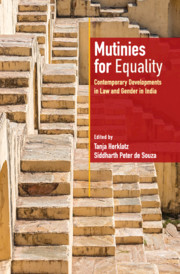8 - The Politics of Erotic Labour: A Case Study of Mumbai Bar Dancers
Published online by Cambridge University Press: 08 June 2021
Summary
Introduction
In August 2006, the Maharashtra government banned the performances of female dancers in Mumbai's bars (‘bar dancing’) through the Bombay Police (Amendment) Act, 2005. The ban on bar dancing effectively rendered over seventy-five thousand bar dancers jobless and led to a large-scale mobilisation and organised opposition against the ban. Bar dancers made themselves visible in the streets of Mumbai and other public spaces, and they went to court and challenged the legal ban on the grounds that it violated their right to work and their right to choose a profession. In doing so, they challenged understandings of the concepts of an ‘honest worker’ and a ‘good woman’ and they argued that their own work in the bars was part of the variety of services we understand as ‘labour’.
In this chapter, I will engage with the ban on bar dancing, the protest of Mumbai's bar dancers against the same and the Supreme Court case on the issue. I look at the topic of bar dancing and labour by engaging with debates by various parties to the contestation: the government and the legislature, feminist scholars, the bargirls and the courts. I engage with the topic of bar dancing from a gender and a caste perspective as well as through a legal lens.
The discussion around the ban on bar dancing shows that the government as well as opposition parties held that bar dancing is a far cry from labour, since they would just ‘shake their bodies’ sinuously in front of a room full of lustful men. The money that the bargirls earn is, therefore, often termed ‘easy money’. It is considered to be ‘too much’ and unethically earned. Politicians asserted that bargirls do not deserve compensation or rehabilitation as workers.
Bargirls and feminist groups contravened this discourse by posing the ban on dancing as a livelihood issue, and demanded reinstatement and compensation as workers. The Bombay High Court struck down the ban in 2006, stating that the ban unlawfully distinguished between bargirls and dancers in five-star hotels, where dancing was not banned. The Supreme Court reiterated this stand in its judgments in 2013 and 2019.
- Type
- Chapter
- Information
- Mutinies for EqualityContemporary Developments in Law and Gender in India, pp. 155 - 169Publisher: Cambridge University PressPrint publication year: 2021



